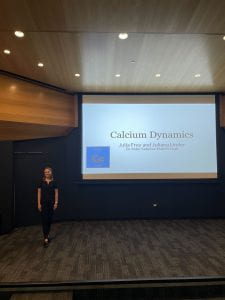1. I participated in Loyola University Chicago’s Cardio SURPh (Summer Undergraduate Research in Physiology) program for my STEP signature project. This was a 10-week research internship investigating cellular physiology of blood vessel cells in Dr. Peter Kekenes-Huskey’s lab. The lab uses biochemical and computational methods in answering research questions.
2. In addition to learning new concepts and techniques, I experienced personal growth. I was not experienced in the areas of the lab’s research and starting college in 2020, many of my lab courses were online so I had very little biological lab experience. I overcame worries about my inexperience and focused on being the best learner I could be. I also advanced my confidence and learning abilities as I adjusted to teaching myself difficult topics outside of the typical structure of school.
My experience also gave me insights on the work environment of research. I was happily surprised by the collaboration and teamwork within different labs in the department, from teaching me experimental methods, answering questions, and borrowing materials.
3. Everyday in the lab I saw the practical applications of what I have learned throughout my degree. I saw lecture slides from general chemistry, math, statistics, and biochemistry come to life with the steps I was doing in experiments. It is rewarding as I enter the final year of my degree to see the applications outside of the classroom.
A formative element of my internship was teaching myself difficult topics. I have always enjoyed school and thrived in the structure but it was an adjustment to learning independently. I was able to learn Python coding and mathematical models to simulate biological phenomena which I had never even heard of before. My final presentation was on my creation of a systems model integrating all I learned which was very rewarding and a great confidence builder.
A major component of my day to day was working in the lab and I learned a variety of methods. My primary responsibility for a month was learning and performing Western Blots, a common biological experimental method that I soon learned is very fickle. The experimental process is long and frustrating especially when days of work yield no results. However, I worked on troubleshooting and eventually was able to identify problems and even train other lab members. I also created the lab’s first protocol so detailed instructions could be used after my program ended.
4. The personal and professional growth throughout my internship is valuable as I continue my exploration into research. Working full time in the lab, I learned the dynamics and team nature of research and affirmed that I want to continue working in research in the future. I also saw the stresses of experiments not working, equipment breaking and the difficult path to gain higher education. I learned about masters, PhDs, MD/PhDs, postdocs and the hierarchy of academic research which is helpful as I discern my future career.
Personally, I gained confidence in applying my degree outside the classroom and grew in my ability to learn outside of the structure of classes. I am excited to see how these skills advance post-graduation as I start my career and eventually pursue higher education. I plan on taking a gap year to continue working in research before becoming a physician. This experience showed me the translation from concepts learned in class to research questions and experimentation and eventually to improve patient outcomes. I plan to continue research in a medical career to connect these translational findings in order to best care for future patients.
This is a picture of me in the lab and me after giving my final presentation!

